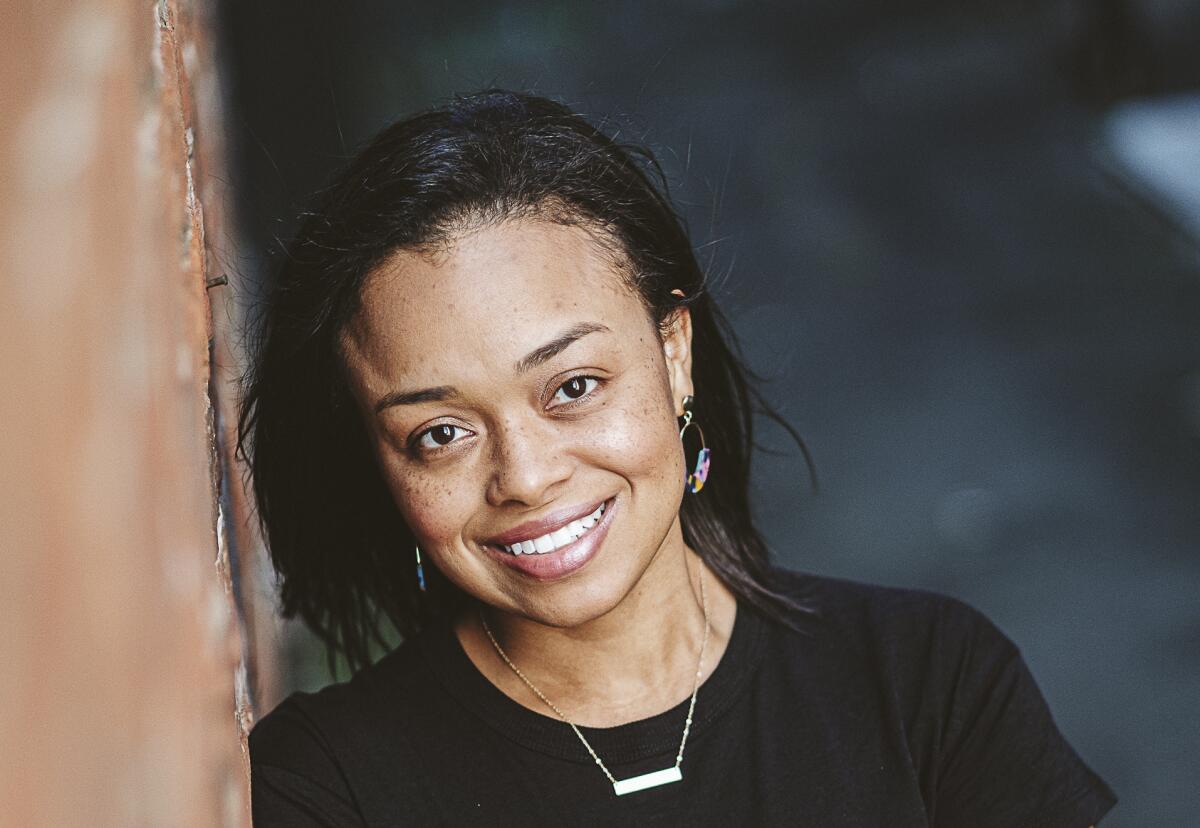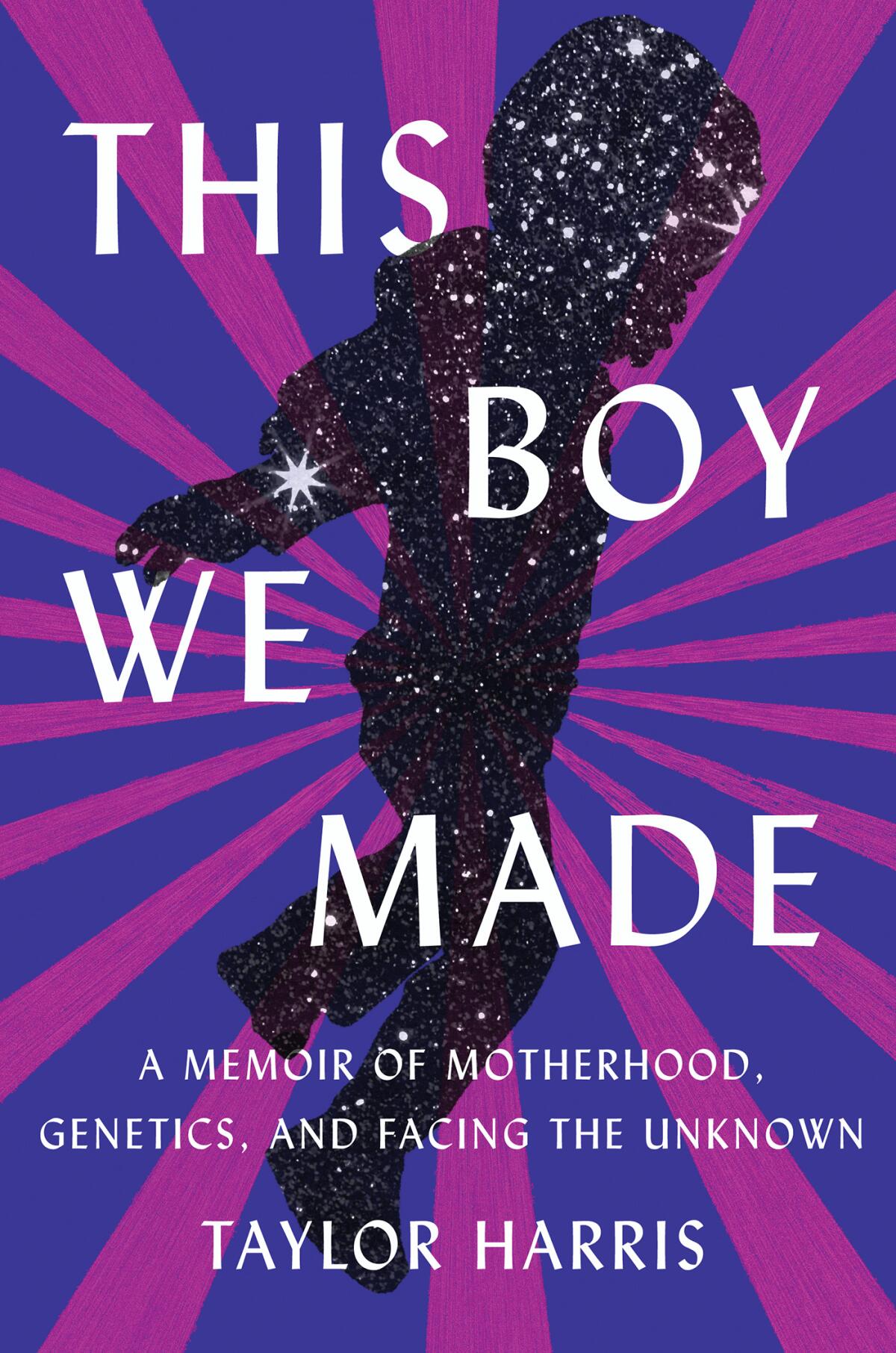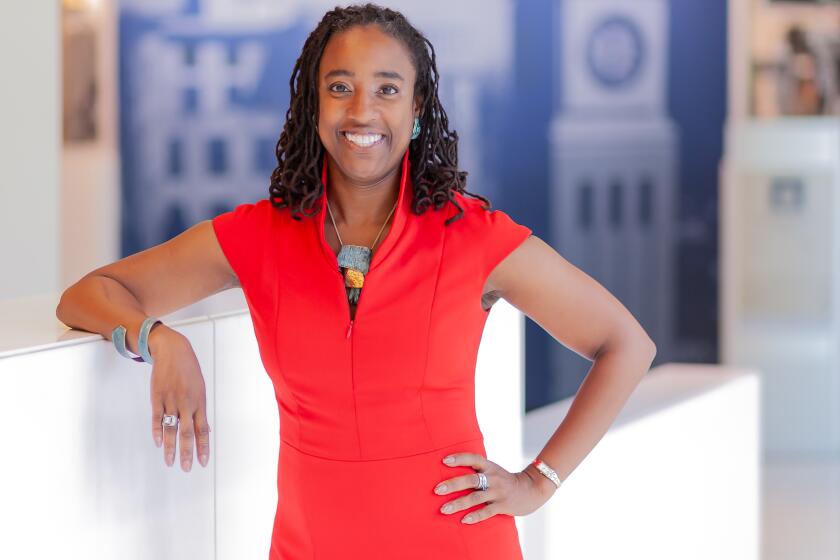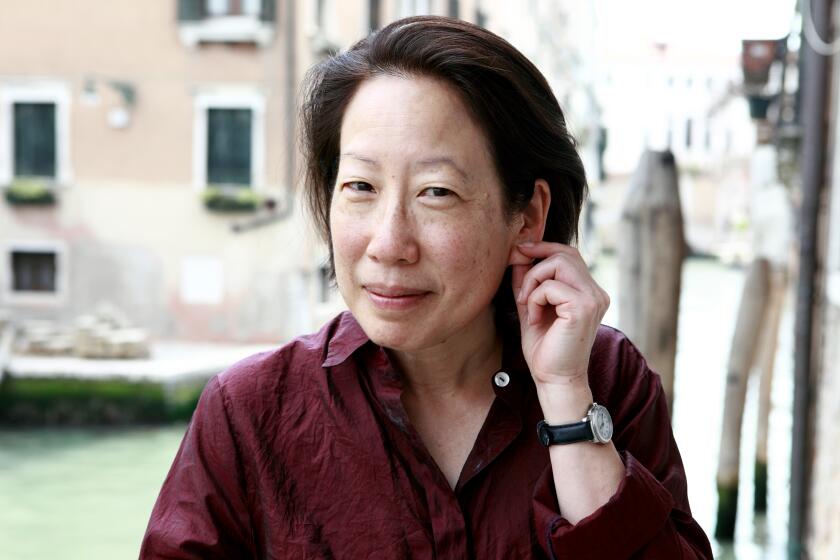Parenting while Black was hard enough for Taylor Harris. Then something went wrong

- Share via
On the Shelf
This Boy We Made: A Memoir of Motherhood, Genetics, and Facing the Unknown
By Taylor Harris
Catapult: 272 pages, $26
If you buy books linked on our site, The Times may earn a commission from Bookshop.org, whose fees support independent bookstores.
Taylor and Paul Harris woke one morning to discover their 22-month-old son, Christopher (nicknamed Tophs), awake but listless. Their second child had always been small for his age, but in Taylor Harris’ memoir, “This Boy We Made,” she recalls trying to sort out maternal anxiety from her sense that something was seriously wrong.
Thus begins their family’s continuing quest to name Tophs’ ailment. It has led to years of genetic testing, of trying to connect those findings with Tophs’ range of symptoms. He is now 9 and has two sisters — Eliot, 11, and Juliet, 5.
For many years Harris was a stay-at-home mother dealing with many demands, including her clinical anxiety and Tophs’ baffling conditions. (Fluctuations in his blood-sugar levels affect his development; the cause remains unknown.) Now, in her debut book, she carefully collects the pearls of experience and strings them together in a wide-ranging and profound memoir, exploring her relationship with God — first as an anxious child and then as a concerned mother — but also her frustrations as a Black woman seeking answers from a dismissive establishment, alongside daily struggles any parent would find familiar.
Formerly residents of Charlottesville, Va., she and her husband of 16 years recently moved to State College, Pa., where Paul is on the faculty at Penn State. Over the end-of-year holidays, Harris and I exchanged emails in which she described America’s institutional shortcomings, writing through anxiety, her evolving faith and why you should bring a friend to a doctor’s appointment.
Kristin Henning has represented young Black defendents for decades. In ‘The Rage of Innocence,’ she makes a powerful case against police in schools
What prompted you to share your family’s story?
I really do write to find out what I’m thinking. I have a strong memory but it thrives on storing images and emotions and some facts, as well as useless quotes from Adam Sandler films. I can’t tell you what color the walls of my bedroom are without looking but I can remember how a particular doctor’s appointment unfolded or the exact genetic mutations we discussed, or how my gut felt when we left the hospital without answers. Imagine a brain like mine, filled with images of a charismatic but sometimes sick child, storing links between mutations and related diseases, gathering disappointment and sadness (but then joy) at every turn. I was overwhelmed. I would drown without a way to sort through, to make sense of it all. I didn’t have to publish it but I did have to write it.
Your experiences of the medical system as a Black woman are stories I think not enough people hear. Do you have advice on how to be your own advocate? And how to solve this disparity overall?
I would suggest having a spouse, partner, friend — someone you trust — or heck, someone you meet at Dunkin’ Donuts who looks the part, either come with you or be on speakerphone. If you are the tough-as-nails, cool-under-pressure type, you might not need this. But if, like me, you are prone to second-guessing yourself or being flooded with emotions and doubt, I would consider having a trusted person on speed dial who can say, “Stand your ground. Don’t let them gaslight you.” I have brilliant Black friends in the medical system who are working every day to change policy and perceptions. For me, it’s walking into an appointment with notes, or knowing the name of a doctor in the hospital, or remembering that I can look at someone in a white coat and say, “I need a minute to think about that.” The burden should not be on individual mothers, so please don’t take my advice in that way. I’m not saying personal over policy. These are just the things that I arm myself with.
You write in the book about your hunger for a diagnosis. Can you talk about how naming something affects its perception?
In looking for a name, I was looking for two things: an anchor and a community. Wrapped up in community is the desire to be seen and acknowledged. I kept wanting to ask teachers and doctors, “Have you ever seen another kid like Tophs?” If another Tophs-like kid existed, I could find his parents, we could nod in agreement over coffee, I could say, “Us too.”
What I mean by “anchor” is a place to land the plane, a sort of home. I realize not everyone wants a name for what they experience, and that’s valid. But with Tophs, I was not scared of a label defining him. I thought, if we can find a place to land, we can start to look around, and either find a map or make our own, and we will have a place to rest and belong.

Your anxiety as a parent predated your concerns over Tophs. Has writing helped you cope with it?
Because of medication and years of therapy, I rarely have panic attacks anymore, but holy moly is the anxiety still present. Every illness or symptom my child exhibits has to make it through a firewall in my brain. I do not want to be overreacting. That’s kind of silly, right? Likely not useful. But one shift that is useful is my willingness to talk to my kids about it. I want them to know Mommy tried really hard to work with this condition because she felt called to the craft of writing, but it took more effort than she could put into words. Writing allows me to tell my story, leave a legacy of truth for my children.
In some ways, writing is perfect for an anxious introvert who might need more breaks than the next person. In other ways, writing is terrible, at least if you’re writing for publication. When I’m working through edits or waiting for a response from an editor, I certainly wish I had more skills that used a different part of my brain. I’m not great with gardening or building things, so I usually bake. This is how I end up baking and eating banana peanut butter Oreo blondies at 10 p.m.
Former U.S. Poet Laureate Natasha Trethewey always wrote of public pain and private struggle. Her memoir, “Memorial Drive,” lets her mother speak.
Caring for Tophs also meant interacting with the school system. I have friends who have been through the IEP [individualized education plan] process, and I can’t think of one of them who loved the experience. Do you think school administrators make this an ordeal to discourage folks from accessing it?
I’m not sure why. It reminds me of the math and science classes in college that you hear exist to weed out students, and particularly Black students at predominantly white institutions like [the University of Virginia]. I’m always curious what happened — was the administrator or educator always like this? If not, what jaded them? What is their boss saying to them? What does the research say?
No one could point to what the cutoff was on certain tests Tophs took [in order to qualify for IEP]. Was it the 12th percentile? The 16th? Or were people making it up as they went along? Sometimes what’s not written is just as important as what’s written in that thick packet of rights they hand you before the meeting. Educational policy is not my area of study, but all I can say is that if Paul and I wanted to overturn tables like Jesus, I imagine there are many other Black families finding themselves frustrated or discouraged.
Your relationship with God plays a huge role in your life. Have you found that your embrace of the science involved in Tophs’ medical care has enriched your faith?
Yes, it has. It’s helped me realize I want nothing to do with the health prosperity gospel. [It] has taught me so much and strengthened my belief that God and science are not at war. As a younger Christian, so much of my development centered on people in the church praying things away. They did it out of love for me, and I would love to be free of pathological fear. But how damaging is it to spend so much time trying to rid yourself of this thing you’ve had since birth? What if, instead, I get to ask Jesus what it means to sit with him in the fear? To say, “I’m tired, Jesus. I don’t have answers. But promise you’ll still stay a while?”
Tophs doesn’t have it all figured out. Sometimes he’s scared about COVID or seizures. But that boy loves life and truly trusts that God has given him a gift. He doesn’t have to separate fear or disability from righteousness or good living. He’s onto something.
When did you first become aware of your desire to write?
I love this question. In first grade, I had this young, beautiful teacher named Mrs. Hall. I worshiped her. She had the ’80s hair, with the sides flared out, and she brought us Fudge Stripe cookies on special days. She must have been fresh out of school, but she recognized that I loved writing in my journal, that I didn’t want to stop when it was time to move on. So she’d let me sit at a table or against the wall in the hallway and write until I was done. Because she gave attention to it, I gave attention to it. She saw this timid but perceptive Black girl among a sea of white faces and prioritized my delight above her own schedule. I can’t give her enough credit for that.
Bethanne Patrick’s January picks cover train wrecks, political drama, enraging inequality, the complications of polyamory and the joy of the ampersand.
Berry writes for a number of publications and tweets @BerryFLW.
More to Read
Sign up for our Book Club newsletter
Get the latest news, events and more from the Los Angeles Times Book Club, and help us get L.A. reading and talking.
You may occasionally receive promotional content from the Los Angeles Times.









